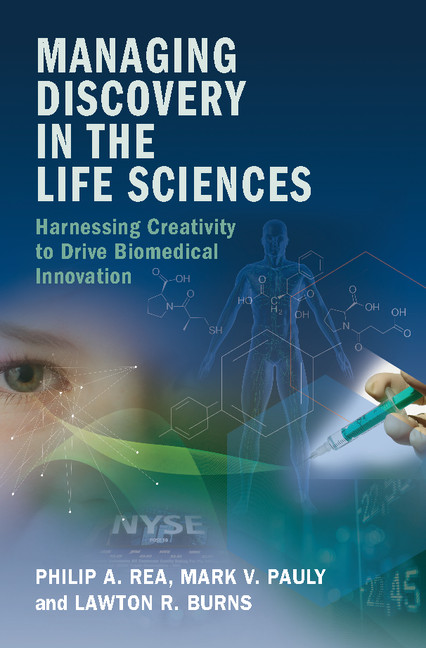Managing Discovery in the Life Sciences
In this book, distinguished scholars Philip A. Rea, Mark V. Pauly, and Lawton R. Burns explore the science and management behind marketable biomedical innovations. They look at how the science actually played out through the interplay of personalities, the cultures within and between academic and corporate entities, and the significance of serendipity not as a mysterious phenomenon but one intrinsic to the successes and failures of the experimental approach. With newly aggregated data and case studies, they consider the fundamental economic underpinnings of investor-driven discovery management, not as an obstacle or deficiency as its critics would contend or as something beyond reproach as some of its proponents might claim, but as the only means by which scientists and managers can navigate the unknowable to discover new products and decide how to sell them so as to maximize the likelihood of establishing a sustainable pipeline for still more marketable biomedical innovations.
- Provides a combination of theory-based management and economics - the challenges faced by scientists in the research laboratory and the challenges faced by investors in deciding which lines of research in which to invest
- Uses non-technical language to present complex material in a clear and accessible way, including graphs and figures which demonstrate the critical biology
- Debunks some unsupportable or illogical criticisms of the pharmaceutical industry while pursuing the logic of profit-maximizing behavior through the provision of patents to guarantee market exclusivity
Reviews & endorsements
'The authors captured the magic of the biomedical industry from the inception of an idea through translational studies that lead to a product that can transform lives. Case studies illustrate the importance of scientific understanding, long periods of experimentation, willingness to take risks. This book is a 'must read' for anyone who wants to better understand drug discovery.' P. Roy Vagelos, Chairman, Regeneron Pharmaceuticals, Inc
'This new study by Philip A. Rea, Mark V. Pauly, and Lawton R. Burns provides useful information and insightful analyses of the biomedical innovation process.' Henry Grabowski, Professor Emeritus of Economics, Duke University, North Carolina
Product details
April 2018Hardback
9781107130906
554 pages
235 × 158 × 29 mm
1.01kg
5 b/w illus. 39 colour illus. 3 tables
Available
Table of Contents
- Preface
- 1. Discoveries now and then: shifting incentives and expectations Mark V. Pauly, Philip A. Rea and Lawton R. Burns
- 2. Pharma trends: not what they seem Kyle Myers and Mark V. Pauly
- 3. Profit maximizing drug firms: models and myths Vicki Chen and Mark V. Pauly
- Transitional note: introduction to the case studies
- 4. The Statins: cholesterols 'penicillins' Philip A. Rea
- 5. ACE inhibitors: kidney clamps, snake venoms and peptidomimetics Alec Ren and Philip A. Rea
- 6. Angioplasty: catheters, guidewires and balloons Simon Basseyn, Sourav Bose, Lawton R. Burns and Chris Groskaufmanis
- 7. Hepatitis C: when cures and prices go viral Stephen Goldstein, Peter M. Stokes, Connie Lu and Philip A. Rea
- 8. Alzheimer's: America's new most feared disease Julian Pei, John Q. Trojanowski, Peter M. Stokes, Katherine Clark, Mark V. Pauly and Philip A. Rea
- 9. Metformin: to the brink and back Anderson Y. Tien and Philip A Rea
- 10. Medical genomics: personalized precision Marc S. Williams
- 11. Gleevec: from broken chromosomes to precision cancer therapy Vivek Nimgaonkar and Philip A. Rea
- 12. Regeneron: agility, resilience and balance Lawton R. Burns, Alex Rosen, Steven Nichtberger and Philip A. Rea
- 13. Avastin and Lucentis: both for eyesight in hindsight Osama Ahmed, Mark V. Pauly, Peter M. Stokes and Philip A. Rea
- 14. CAR T-cell therapy: cures for ALL and more? Stephen Goldstein, Amy Le and Philip A. Rea
- 15. Organizing discovery: wild ducks nested in multilevel ecosystems Lawton R. Burns and Philip A. Rea
- 16. Can government help with the creatively unexpected? Mark V. Pauly, Lawton R. Burns and Philip A. Rea
- Appendix: three key elements in the discovery process: historical and philosophical antecedents Mark V. Pauly
- Index.







